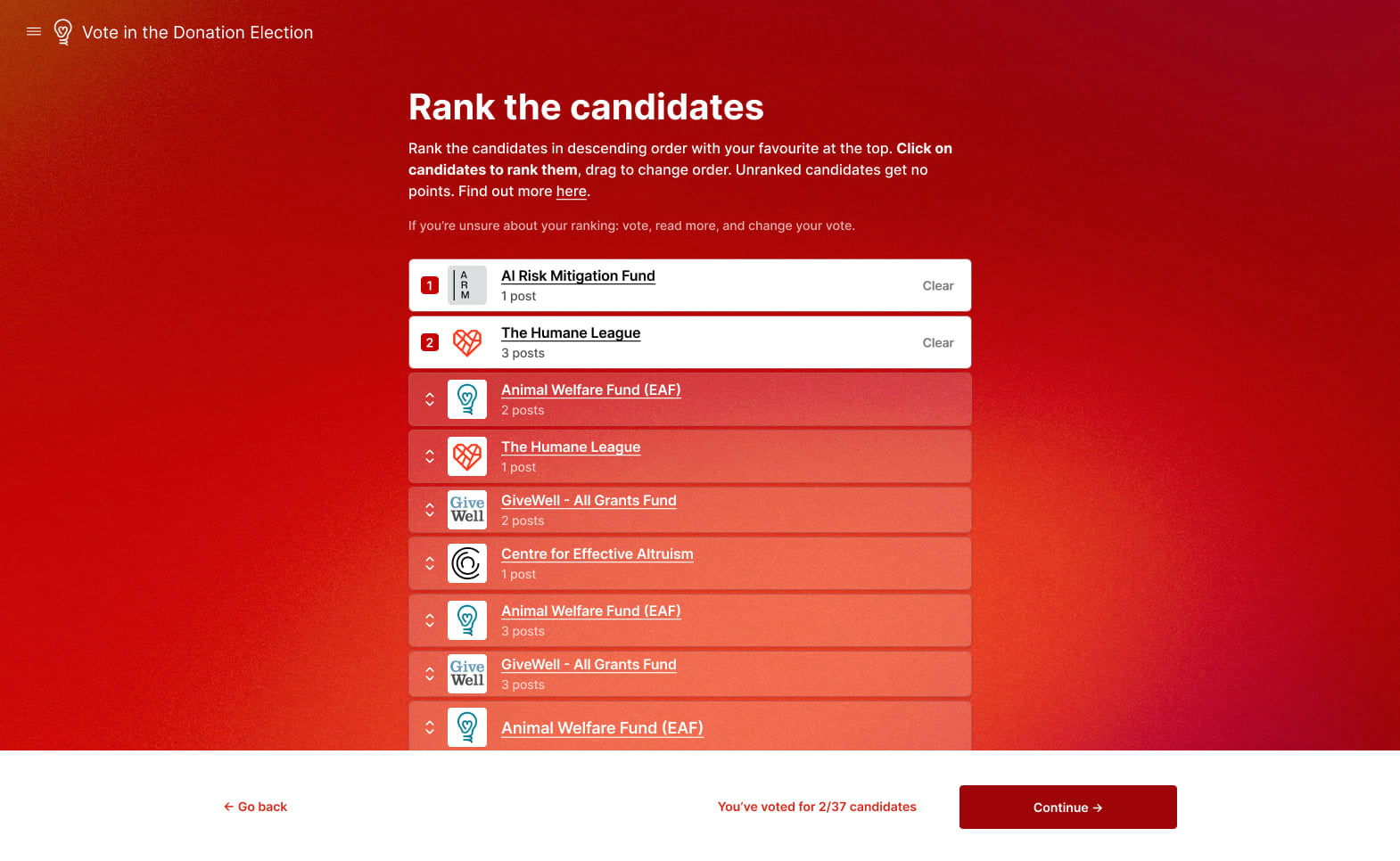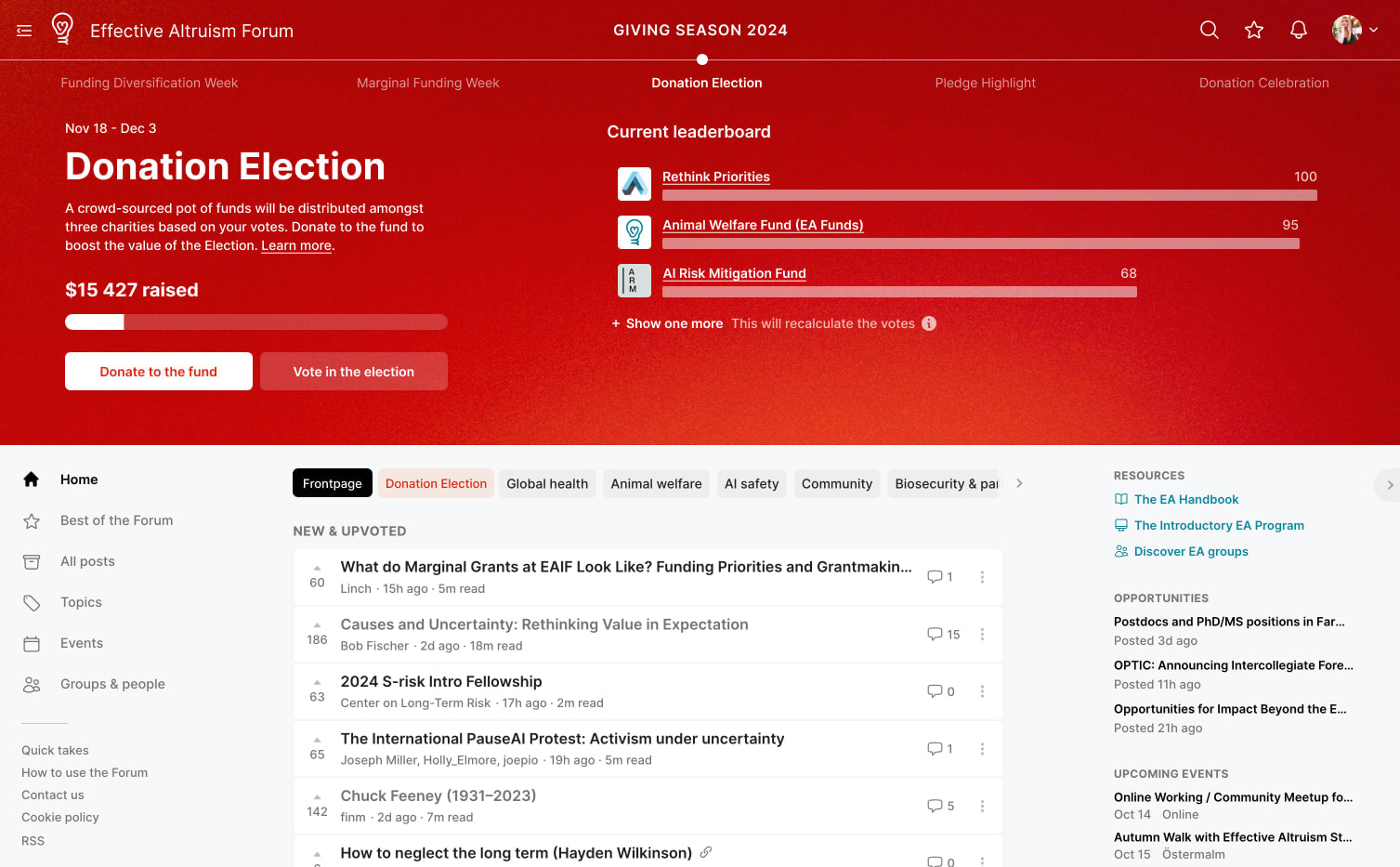Donation Election: How to vote
By Toby Tremlett🔹, Will Howard🔹 @ 2024-11-14T11:34 (+41)
We'll add a link to the voting portal when it launches on Monday. Update: here's the link
Voting for the 2024 Donation Election will open on the 18th November, and close on December 3rd. Anyone with an account that existed before 22nd October will be eligible to vote.
The voting system has changed a bit since last year. We’re going with a much simpler ranked choice system that will look like this:

You will rank the candidates (1, 2, 3, etc…) in order of preference, with no need to rank all candidates[1]. You will be able to change your vote as many times as you like before the deadline.
The system for adding up the votes is very similar to the ranked choice/instant runoff system that is used in some political elections[2]. The votes will be aggregated in the following way:
- Add up everyone’s 1st choice to get a count for each candidate.
- If there are more than 3 candidates with any votes, eliminate the least popular, and redistribute those votes according to the voters' next favourite choice.
- Repeat step 2 until there are only 3 candidates remaining.
This will result in 3 winners with a vote count for each of them. The money will then be distributed proportional to this final vote count (e.g. 305, 201, 157 votes respectively will mean the pot is split 45%, 29%, 26%).
Viewing the running count
Also unlike last year, the running total will be visible while voting is open (once 100 votes have been cast). This will appear on the Frontpage banner like so:

By default only the top 3 (expected winners) will be shown. You can expand to see the vote count for lower ranked candidates, which could be useful for tactical voting (e.g. switching your top vote to a candidate that is just about to make it into the top 3).
The meaning of the vote counts when you expand beyond 3 is a bit subtle, it effectively “un-eliminates” the next best candidate. This could result in slightly confusing behaviour like the top candidates changing order in the leaderboard.
The reason for this behaviour is that eliminated candidates have their votes reallocated (as explained above) to more popular candidates, so un-eliminating one to display it on the leaderboard removes these votes from the more popular candidates.
Voting norms
The biggest change to the election this year is the visible leaderboard on the banner. This means that users will be able to vote tactically to try to change the leaderboard.
This election matters– real money is being distributed, and the EA Forum will be promoting the winners after the election. So we are going to be watching out for bannable voter fraud, and suspicious voting behaviour. To be clear on what we mean by this:
What’s allowed
- Tactical voting: Your vote doesn’t have to represent your true preference order. Perhaps you see that the candidate that is currently in 3rd place seems a lot worse to you than the candidate that is in 4th. In that case, you are free to change your vote to put the 4th place candidate in 1st (even if they wouldn’t be your top choice).
- Changing your vote: You can change your vote as many times as you like until the deadline.
What’s not allowed
- Double voting (bannable): If you have multiple accounts you may only vote from one of them (we have ways of checking).
- Vote brigading (can be bannable): Everyone is encouraged to write posts that argue the case for particular organisations or projects, and attempt to explain to the Forum audience why they should vote for them. However, we will be watching out for large groups of people voting for their own organisations, or other attempts to mobilise blocks of votes by means which are not rational persuasion. We reserve the right to nullify votes if we see suspicious behaviour.
- Vote sniping (unsporting): We don’t want to see the ranking change drastically in the last few moments of the election, as voters tactically wait for the last minute to vote. This would mean far less time for the Forum to have mind-changing discussions. To avoid this, we aren’t sharing the deadline for voting. Votes will end at some point on December 3rd.
How to contribute in other ways
Comment on the Donation Election discussion thread: This Donation Election, we will have a discussion thread pinned to the top of the Frontpage (like this one during the last debate week). When you vote, you’ll be prompted to leave a comment to be crossposted there. You can also engage with the comments and discussions on the thread at any time, and in fact, I encourage you to. A lot of the valuable discussion during the Donation Election is likely to happen there.
Post something: You can use this tag for Donation Election posts. As I said, I expect that most discussion will happen on the discussion thread, but this doesn’t have to be the case. Perhaps you’d like to:
- Make a cause-prioritisation argument which could shift Donation Election voters wholesale towards a particular cause.
- Turn a disagreement on the discussion thread into a public dialogue.
- Make a full argument for your favoured candidate.
All of these could be valuable Donation Election posts. If you’re unsure whether your post idea is suitable for the Donation Election, as always, message me.
Donate to the Donation Election Fund: Donating to the fund will make the election more exciting, for Forum users and for the organisations taking part. Depending on how much you donate, you could also be eligible for rewards, for you or for everyone.
- ^
Unranked candidates will never get any points from you, so it’s technically a lower preference than putting a candidate last (although more likely you just don’t have an opinion)
- ^
The one difference is that in political elections, the result is decided when an elimination round gives one candidate >50% of the vote, whereas in this case the result is decided when all but 3 candidates are eliminated.
Jeff Kaufman 🔸 @ 2024-11-14T12:06 (+10)
I really appreciate you writing up the Voting Norms section! Making it clear when you see "tactical" participation as beneficial vs harmful is very helpful.
Lorenzo Buonanno🔸 @ 2024-11-14T12:23 (+3)
If there are more than 3 candidates with any votes, eliminate the least popular, and redistribute those votes according to the voters' next favourite choice.
What happens if there's a tie? E.g. if there are 4 candidates with 30, 20, 10, 10 votes each.
I guess it's unlikely to be determinant in practice but might be worth stating just in case.
ETA: https://electowiki.org/wiki/Instant-runoff_voting#Handling_ties_in_IRV_elections
Toby Tremlett🔹 @ 2024-11-14T12:30 (+5)
My first guess is that if this did happen, we'd keep the votes open slightly longer until there wasn't a tie - this is another benefit of having a secret deadline. I'll check with @Will Howard🔹 when he's online to see if there is already a solution to this. Thanks for pointing it out!
Will Howard🔹 @ 2024-11-14T14:34 (+8)
(Discussed separately) I think it would be best to split the pot 4 ways if this happens, because there is some chance of introducing a bias by deciding when to end based on a property of the votes. Or if there is some reason we can't do this that I'm not aware of (e.g. legal constraints), then breaking the tie with a coin flip.
(@Lorenzo Buonanno🔸 You can consider this the official answer unless I hear otherwise).
Lorenzo Buonanno🔸 @ 2024-11-14T17:17 (+4)
There can be ties at any point during the iterative elimination process, not just during the final round (if anything they are more likely in earlier rounds).
From the link above:
For small IRV elections, there can be frequent last-place ties that prevent clear bottom elimination, so it's critically important to have a clear tie-breaking mechanism in jurisdictions with few voters.
Will Howard🔹 @ 2024-11-14T17:45 (+4)
Ah, I hadn't thought of that, and I can see how this makes the results indeterminate (because reallocating the votes from one joint-last candidate could bump the other joint-last candidate up from the bottom).
I'll have a think about how to handle this and get back to you, my initial thought is still to break ties randomly (with a stable-but-random ranking of the precedence of each candidate in a tie).
Will Howard🔹 @ 2025-10-29T12:50 (+2)
Update (I came across this while prepping voting for this year's election): I did add this random tie breaking in the system last year, and by default it will be used again this year
Jason @ 2024-11-14T13:00 (+8)
Not that I expect the election administrators to be unsporting, but there should be an explicit norm that they do not vote after the evening of December 2 as they could not only snipe but maybe even cast a de facto tiebreaking vote on December 3 with inside knowledge. (I know of at least EA-adjacent place where using inside information to one's advantage is seen as fine, hence the desire to be clear here.)
Toby Tremlett🔹 @ 2024-11-14T13:23 (+6)
Fair enough!
I publicly declare that the people with knowledge of the deadline will not vote after the evening of December 2.
I'll also make sure that we pre-commit internally to a deadline, so that we can't game the results by choosing the cut off.
Vasco Grilo🔸 @ 2024-11-20T12:52 (+1)
Hi Toby and Will. Not sure if it is intended, but the running total of votes does not seem to be available.
Toby Tremlett🔹 @ 2024-11-20T12:53 (+5)
It'll be revealed when we hit 100 votes, which should be very soon...